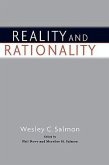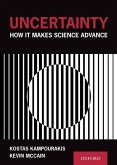Schade – dieser Artikel ist leider ausverkauft. Sobald wir wissen, ob und wann der Artikel wieder verfügbar ist, informieren wir Sie an dieser Stelle.
- Gebundenes Buch
- Merkliste
- Auf die Merkliste
- Bewerten Bewerten
- Teilen
- Produkt teilen
- Produkterinnerung
- Produkterinnerung
In Systematicity, Paul Hoyningen-Huene answers the question What is science? by proposing that scientific knowledge is primarily distinguished from other forms of knowledge, especially from everyday knowledge, by being more systematic.
Andere Kunden interessierten sich auch für
![Value-Free Science Value-Free Science]() Harold Kincaid / John Dupré / Alison Wylie (eds.)Value-Free Science108,99 €
Harold Kincaid / John Dupré / Alison Wylie (eds.)Value-Free Science108,99 €![Philosophy of Science Matters Philosophy of Science Matters]() Philosophy of Science Matters95,99 €
Philosophy of Science Matters95,99 €![Wondrous Truths Wondrous Truths]() J D TroutWondrous Truths40,99 €
J D TroutWondrous Truths40,99 €![Reality and Rationality Reality and Rationality]() Wesley C SalmonReality and Rationality161,99 €
Wesley C SalmonReality and Rationality161,99 €![Uncertainty Uncertainty]() Kostas KampourakisUncertainty48,99 €
Kostas KampourakisUncertainty48,99 €![Everywhere and Everywhen Everywhere and Everywhen]() Nick HuggettEverywhere and Everywhen105,99 €
Nick HuggettEverywhere and Everywhen105,99 €![Understanding Inconsistent Science C Understanding Inconsistent Science C]() VickersUnderstanding Inconsistent Science C127,99 €
VickersUnderstanding Inconsistent Science C127,99 €-
-
-
In Systematicity, Paul Hoyningen-Huene answers the question What is science? by proposing that scientific knowledge is primarily distinguished from other forms of knowledge, especially from everyday knowledge, by being more systematic.
Produktdetails
- Produktdetails
- Verlag: Oxford University Press
- Seitenzahl: 304
- Erscheinungstermin: 26. April 2013
- Englisch
- Abmessung: 244mm x 159mm x 30mm
- Gewicht: 530g
- ISBN-13: 9780199985050
- ISBN-10: 0199985057
- Artikelnr.: 36868234
- Herstellerkennzeichnung
- Libri GmbH
- Europaallee 1
- 36244 Bad Hersfeld
- gpsr@libri.de
- Verlag: Oxford University Press
- Seitenzahl: 304
- Erscheinungstermin: 26. April 2013
- Englisch
- Abmessung: 244mm x 159mm x 30mm
- Gewicht: 530g
- ISBN-13: 9780199985050
- ISBN-10: 0199985057
- Artikelnr.: 36868234
- Herstellerkennzeichnung
- Libri GmbH
- Europaallee 1
- 36244 Bad Hersfeld
- gpsr@libri.de
Paul Hoyningen-Huene is a philosopher of science with a PhD in theoretical physics teaching at the Institute of Philosophy at the Leibniz University of Hannover, Germany. He is best known for his book Reconstructing Scientific Revolutions: Thomas S. Kuhn's Philosophy of Science (1993).
Preface
1 Introduction
1.1 Historical Remarks
1.2 The Question "What Is Science?" in Focus
2 The Main Thesis
2.1 Science and Systematicity
A) A Little History
B) Preliminary Remarks
2.2 The Concept of Systematicity
2.3 The Structure of the Argument
3 The Systematicity of Science Unfolded
3.1 Descriptions
A) Some Preliminaries
B) Axiomatization
C) Classification, Taxonomy, and Nomenclature
D) Periodization
E) Quantification
F) Empirical Generalizations
G) Historical Descriptions
3.2 Explanations
A) Some Preliminaries
B) Explanations Using Empirical Generalizations
C) Explanations Using Theories
D) Explanations of Human Actions
E) Reductive Explanations
F) Historical Explanations
G) Explanation and Understanding in the Humanities in General
H) Explanations in the Study of Literature
3.3 Predictions
A) Some Preliminaries
B) Predictions Based on Empirical Regularities of the Data in Question
C) Predictions Based on Correlations with Other Data Sets
D) Predictions Based on (Fundamental) Theories or Laws
E) Predictions Based on Models
F) Predictions Based on Delphi Methods
3.4 The Defense of Knowledge Claims
A) Some Preliminaries
B) Non-Evidential Considerations
C) Empirical Generalizations, Models, and Theories
D) Causal Influence
E) The Verum Factum Principle
F) The Role of Mathematics in the Sciences
G) Historical Sciences
3.5 Critical Discourse
A) Some Preliminaries
B) Norms and Institutions
C) Practices in Science Fostering Critical Discourse
3.6. Epistemic Connectedness
A) Preliminaries: The Problem
B) Failing Answers
C) The Concept of Epistemic Connectedness
D) Revisiting the Examples
3.7 The Ideal of Completeness
A) Some Preliminaries
B) Examples
3.8 The Generation of New Knowledge
A) Some Preliminaries
B) Data Collection
C) The Exploitation of Knowledge from Other Domains
D) The Generation of New Knowledge as an Autocatalytic Process
3.9 The Representation of Knowledge
A) Some Preliminaries
B) Examples
4 Comparison with Other Positions
4.1 Aristotle
A) The Position
B) Comparison with Systematicity Theory
4.2 René Descartes
A) The Position
B) Comparison with Systematicity Theory
4.3 Immanuel Kant
A) The Position
B) Comparison with Systematicity Theory
4.4 Logical Empiricism
A) The Position
B) Comparison with Systematicity Theory
4.5 Karl R. Popper
A) The Position
B) Comparison with Systematicity Theory
4.6 Thomas S. Kuhn
A) The Position
B) Comparison with Systematicity Theory
4.7 Paul K. Feyerabend
A) The Position
B) Comparison with Systematicity Theory
4.8 Nicholas Rescher
A) The Position
B) Comparison with Systematicity Theory
5 Consequences for Scientific Knowledge
5.1 The Genesis and Dynamics of Science
A) Conceptual Clarifications
B) The Genesis of a Science
C) The Dynamics of Science
5.2 Science and Common Sense
A) The Preservation of Common Sense
B) The Deviations from Common Sense
C) Additional Remarks
5.3 Normative Consequences
5.4 Demarcation from Pseudo-Science
A) A Little History
B) Systematicity Theory's Demarcation Criterion
6 Conclusion
Notes
Literature
Literature
1 Introduction
1.1 Historical Remarks
1.2 The Question "What Is Science?" in Focus
2 The Main Thesis
2.1 Science and Systematicity
A) A Little History
B) Preliminary Remarks
2.2 The Concept of Systematicity
2.3 The Structure of the Argument
3 The Systematicity of Science Unfolded
3.1 Descriptions
A) Some Preliminaries
B) Axiomatization
C) Classification, Taxonomy, and Nomenclature
D) Periodization
E) Quantification
F) Empirical Generalizations
G) Historical Descriptions
3.2 Explanations
A) Some Preliminaries
B) Explanations Using Empirical Generalizations
C) Explanations Using Theories
D) Explanations of Human Actions
E) Reductive Explanations
F) Historical Explanations
G) Explanation and Understanding in the Humanities in General
H) Explanations in the Study of Literature
3.3 Predictions
A) Some Preliminaries
B) Predictions Based on Empirical Regularities of the Data in Question
C) Predictions Based on Correlations with Other Data Sets
D) Predictions Based on (Fundamental) Theories or Laws
E) Predictions Based on Models
F) Predictions Based on Delphi Methods
3.4 The Defense of Knowledge Claims
A) Some Preliminaries
B) Non-Evidential Considerations
C) Empirical Generalizations, Models, and Theories
D) Causal Influence
E) The Verum Factum Principle
F) The Role of Mathematics in the Sciences
G) Historical Sciences
3.5 Critical Discourse
A) Some Preliminaries
B) Norms and Institutions
C) Practices in Science Fostering Critical Discourse
3.6. Epistemic Connectedness
A) Preliminaries: The Problem
B) Failing Answers
C) The Concept of Epistemic Connectedness
D) Revisiting the Examples
3.7 The Ideal of Completeness
A) Some Preliminaries
B) Examples
3.8 The Generation of New Knowledge
A) Some Preliminaries
B) Data Collection
C) The Exploitation of Knowledge from Other Domains
D) The Generation of New Knowledge as an Autocatalytic Process
3.9 The Representation of Knowledge
A) Some Preliminaries
B) Examples
4 Comparison with Other Positions
4.1 Aristotle
A) The Position
B) Comparison with Systematicity Theory
4.2 René Descartes
A) The Position
B) Comparison with Systematicity Theory
4.3 Immanuel Kant
A) The Position
B) Comparison with Systematicity Theory
4.4 Logical Empiricism
A) The Position
B) Comparison with Systematicity Theory
4.5 Karl R. Popper
A) The Position
B) Comparison with Systematicity Theory
4.6 Thomas S. Kuhn
A) The Position
B) Comparison with Systematicity Theory
4.7 Paul K. Feyerabend
A) The Position
B) Comparison with Systematicity Theory
4.8 Nicholas Rescher
A) The Position
B) Comparison with Systematicity Theory
5 Consequences for Scientific Knowledge
5.1 The Genesis and Dynamics of Science
A) Conceptual Clarifications
B) The Genesis of a Science
C) The Dynamics of Science
5.2 Science and Common Sense
A) The Preservation of Common Sense
B) The Deviations from Common Sense
C) Additional Remarks
5.3 Normative Consequences
5.4 Demarcation from Pseudo-Science
A) A Little History
B) Systematicity Theory's Demarcation Criterion
6 Conclusion
Notes
Literature
Literature
Preface
1 Introduction
1.1 Historical Remarks
1.2 The Question "What Is Science?" in Focus
2 The Main Thesis
2.1 Science and Systematicity
A) A Little History
B) Preliminary Remarks
2.2 The Concept of Systematicity
2.3 The Structure of the Argument
3 The Systematicity of Science Unfolded
3.1 Descriptions
A) Some Preliminaries
B) Axiomatization
C) Classification, Taxonomy, and Nomenclature
D) Periodization
E) Quantification
F) Empirical Generalizations
G) Historical Descriptions
3.2 Explanations
A) Some Preliminaries
B) Explanations Using Empirical Generalizations
C) Explanations Using Theories
D) Explanations of Human Actions
E) Reductive Explanations
F) Historical Explanations
G) Explanation and Understanding in the Humanities in General
H) Explanations in the Study of Literature
3.3 Predictions
A) Some Preliminaries
B) Predictions Based on Empirical Regularities of the Data in Question
C) Predictions Based on Correlations with Other Data Sets
D) Predictions Based on (Fundamental) Theories or Laws
E) Predictions Based on Models
F) Predictions Based on Delphi Methods
3.4 The Defense of Knowledge Claims
A) Some Preliminaries
B) Non-Evidential Considerations
C) Empirical Generalizations, Models, and Theories
D) Causal Influence
E) The Verum Factum Principle
F) The Role of Mathematics in the Sciences
G) Historical Sciences
3.5 Critical Discourse
A) Some Preliminaries
B) Norms and Institutions
C) Practices in Science Fostering Critical Discourse
3.6. Epistemic Connectedness
A) Preliminaries: The Problem
B) Failing Answers
C) The Concept of Epistemic Connectedness
D) Revisiting the Examples
3.7 The Ideal of Completeness
A) Some Preliminaries
B) Examples
3.8 The Generation of New Knowledge
A) Some Preliminaries
B) Data Collection
C) The Exploitation of Knowledge from Other Domains
D) The Generation of New Knowledge as an Autocatalytic Process
3.9 The Representation of Knowledge
A) Some Preliminaries
B) Examples
4 Comparison with Other Positions
4.1 Aristotle
A) The Position
B) Comparison with Systematicity Theory
4.2 René Descartes
A) The Position
B) Comparison with Systematicity Theory
4.3 Immanuel Kant
A) The Position
B) Comparison with Systematicity Theory
4.4 Logical Empiricism
A) The Position
B) Comparison with Systematicity Theory
4.5 Karl R. Popper
A) The Position
B) Comparison with Systematicity Theory
4.6 Thomas S. Kuhn
A) The Position
B) Comparison with Systematicity Theory
4.7 Paul K. Feyerabend
A) The Position
B) Comparison with Systematicity Theory
4.8 Nicholas Rescher
A) The Position
B) Comparison with Systematicity Theory
5 Consequences for Scientific Knowledge
5.1 The Genesis and Dynamics of Science
A) Conceptual Clarifications
B) The Genesis of a Science
C) The Dynamics of Science
5.2 Science and Common Sense
A) The Preservation of Common Sense
B) The Deviations from Common Sense
C) Additional Remarks
5.3 Normative Consequences
5.4 Demarcation from Pseudo-Science
A) A Little History
B) Systematicity Theory's Demarcation Criterion
6 Conclusion
Notes
Literature
Literature
1 Introduction
1.1 Historical Remarks
1.2 The Question "What Is Science?" in Focus
2 The Main Thesis
2.1 Science and Systematicity
A) A Little History
B) Preliminary Remarks
2.2 The Concept of Systematicity
2.3 The Structure of the Argument
3 The Systematicity of Science Unfolded
3.1 Descriptions
A) Some Preliminaries
B) Axiomatization
C) Classification, Taxonomy, and Nomenclature
D) Periodization
E) Quantification
F) Empirical Generalizations
G) Historical Descriptions
3.2 Explanations
A) Some Preliminaries
B) Explanations Using Empirical Generalizations
C) Explanations Using Theories
D) Explanations of Human Actions
E) Reductive Explanations
F) Historical Explanations
G) Explanation and Understanding in the Humanities in General
H) Explanations in the Study of Literature
3.3 Predictions
A) Some Preliminaries
B) Predictions Based on Empirical Regularities of the Data in Question
C) Predictions Based on Correlations with Other Data Sets
D) Predictions Based on (Fundamental) Theories or Laws
E) Predictions Based on Models
F) Predictions Based on Delphi Methods
3.4 The Defense of Knowledge Claims
A) Some Preliminaries
B) Non-Evidential Considerations
C) Empirical Generalizations, Models, and Theories
D) Causal Influence
E) The Verum Factum Principle
F) The Role of Mathematics in the Sciences
G) Historical Sciences
3.5 Critical Discourse
A) Some Preliminaries
B) Norms and Institutions
C) Practices in Science Fostering Critical Discourse
3.6. Epistemic Connectedness
A) Preliminaries: The Problem
B) Failing Answers
C) The Concept of Epistemic Connectedness
D) Revisiting the Examples
3.7 The Ideal of Completeness
A) Some Preliminaries
B) Examples
3.8 The Generation of New Knowledge
A) Some Preliminaries
B) Data Collection
C) The Exploitation of Knowledge from Other Domains
D) The Generation of New Knowledge as an Autocatalytic Process
3.9 The Representation of Knowledge
A) Some Preliminaries
B) Examples
4 Comparison with Other Positions
4.1 Aristotle
A) The Position
B) Comparison with Systematicity Theory
4.2 René Descartes
A) The Position
B) Comparison with Systematicity Theory
4.3 Immanuel Kant
A) The Position
B) Comparison with Systematicity Theory
4.4 Logical Empiricism
A) The Position
B) Comparison with Systematicity Theory
4.5 Karl R. Popper
A) The Position
B) Comparison with Systematicity Theory
4.6 Thomas S. Kuhn
A) The Position
B) Comparison with Systematicity Theory
4.7 Paul K. Feyerabend
A) The Position
B) Comparison with Systematicity Theory
4.8 Nicholas Rescher
A) The Position
B) Comparison with Systematicity Theory
5 Consequences for Scientific Knowledge
5.1 The Genesis and Dynamics of Science
A) Conceptual Clarifications
B) The Genesis of a Science
C) The Dynamics of Science
5.2 Science and Common Sense
A) The Preservation of Common Sense
B) The Deviations from Common Sense
C) Additional Remarks
5.3 Normative Consequences
5.4 Demarcation from Pseudo-Science
A) A Little History
B) Systematicity Theory's Demarcation Criterion
6 Conclusion
Notes
Literature
Literature








